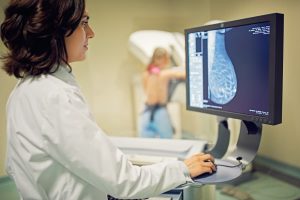
What Is Head and Neck Cancer?
Cancers that develop in the throat, mouth, and nose region are collectively known as head and neck cancer. These can have a significant impact on
HIPAA Alert: Potential Data Breach Learn More
Questions on Oncology, Hematology and/or Infusion Clinical Services due to COVID-19 Crisis – CALL 833-698-1623
Important Information for Our Patients Regarding the Coronavirus.
RCCA Providing Area Cancer Patients with Access to Care During Coronavirus Outbreak
RCCA Offering Patients Virtual Visits During Coronavirus Pandemic
The thyroid is a butterfly-shaped gland in the neck, just above the collarbone. It produces hormones that control the rate of many bodily functions, including heartbeat and metabolism of calories. The thyroid is composed of many different types of cells. Different cancers may develop from these cells, and each type of thyroid cancer requires a specific treatment. The oncologists and hematologists of Regional Cancer Care Associates specialize in treating numerous cancer types and blood disorders, including thyroid cancer. Tens of thousands of people throughout New Jersey, Connecticut, Massachusetts, and the Washington, DC, area trust these experienced specialists to deliver comprehensive, compassionate, patient-centered care.
Because the thyroid contains various kinds of cells, cancers that occur in the gland can take many different forms. Common forms of thyroid cancer include:
There are several other, less-common forms of thyroid cancer, as well.
Some benign conditions affecting the thyroid may share symptoms with cancer. These illnesses include an overactive, underactive, and enlarged thyroid, as well as cysts and nodules on the gland.

Although the exact causes of thyroid cancer have not been fully determined, doctors have found that some factors increase the possibility that a person will contract the disease. These risk factors are:
Unlike some other cancers, thyroid cancer is highly curable. According to the American Cancer Society, the 5-year survival rate for papillary and follicular thyroid cancer that has not spread to nearby structures or other organs is almost 100%. However, this percentage falls considerably if the cancer has moved to other areas of the body.

Patients with thyroid cancer often do not display signs or symptoms of the disease until it has progressed. A common symptom of thyroid cancer is a nodule, or lump, in the neck. These growths usually are benign but may become malignant. The following are other symptoms frequently experienced by patients with thyroid cancer:
The various types of thyroid cancer each have unique staging systems that help doctors determine the best treatment plan for a particular patient.
Age also factors into staging for some thyroid cancers. People younger than 55 years who develop the papillary or follicular varieties are included only in Stages I and II. Older patients may fall into these stages or Stages III or IV, depending on the degree to which the tumor has spread.
Treatment choices for thyroid cancer are similar to the options for other cancers. Treatments include chemotherapy, radiation therapy, surgery, or a combination of these techniques. Treatment options for thyroid cancer also include:
While these treatments work for many people, and may even cure them of cancer, patients should still follow up with their doctors regularly to ensure the disease has not returned. If cancer continues to recur, a physician may recommend ongoing treatment. Regardless of the specific circumstances, patients can rely on the oncologists and hematologists of RCCA for the treatment they need.
Patients seeking comprehensive, compassionate care from expert thyroid cancer specialists should turn to Regional Cancer Care Associates. RCCA’s oncologists and hematologists serve patients at 25 community-based care centers across New Jersey, Connecticut, Massachusetts, and the Washington, DC, area, providing innovative, evidence-based and patient-centered treatment for cancers and blood disorders. Visit one of these locations to learn more about the thyroid cancer treatment offered by RCCA.
If you’re seeking expert diagnosis and treatment close to home, consider Regional Cancer Care Associates (RCCA). As part of one of the largest cancer care networks in the country, we focus on every patient, individually. You’ll receive advanced, dedicated and compassionate cancer care from RCCA. We’ll work with you and your caregivers to make sure your care is second to none.
You can schedule an appointment by calling the RCCA location nearest you. You can also call (844) 346-7222.

Cancers that develop in the throat, mouth, and nose region are collectively known as head and neck cancer. These can have a significant impact on

Medical researchers and specialists are continually searching for ways to diagnose and treat diseases more effectively. Clinical trials help those experts explore new technologies to

Routine mammograms are an important part of breast cancer detection. Mammogram testing can detect signs of cancer long before symptoms develop, giving patients and oncologists
When standard cancer treatments aren’t providing the results you want, clinical trials may offer hope. Our physicians use clinical trials to study new treatments, helping transform cancer care for the better. You can enroll in a clinical trial to try groundbreaking treatment plans at zero cost to you.

Regional Cancer Care Associates is one of fewer than 200 medical practices in the country selected to participate in the Oncology Care Model (OCM); a recent Medicare initiative aimed at improving care coordination and access to and quality of care for Medicare beneficiaries undergoing chemotherapy treatment.